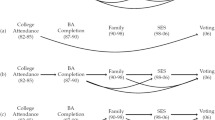Abstract
A body of accumulating evidence appears to support the finding that collectivist economic concerns and assessments of government economic performance directly influence voting behavior independent of other predispositions and cleavages. This seems reasonable and is well documented across both cultures and time periods. What remains more inconclusive is how to explain fluctuations in the electoral impact of personal economic worries. Our comparison of Norwegian and U.S. data has suggested that cognitive, social and political factors may all influence this association. The political information and cues for connecting the two spheres may be absent for most elections and for most people. Nevertheless, in some elections and under certain conditions individual economic worries can have a significant, independent impact on election outcomes. A major goal of future political-economy research, therefore, should be to specify more completely those factors that facilitate the linkage of personal and collectivist economic concerns.
Similar content being viewed by others
References
Feldman, S. (1982). Economic self-interest and political behavior.American Journal of Political Science 26:446–466.
Fiorina, M. P. (1981).Retrospective Voting in American Presidential Elections. New Haven: Yale University Press.
Frey, B. (1979). Politometrics of government behavior in a democracy.Scandinavian Journal of Economics 81:308–322.
Jonung, L., and Wadensjö, E. (1979). The effect of unemployment, inflation and real income growth on government popularity in Sweden.Scandinavian Journal of Economics 81:343–353.
Kinder, D., and Kiewiet, D. (1979). Economic discontent and political behavior: the role of personal grievances and collective economic judgments in congressional voting.American Journal of Political Science 23:495–527.
Kinder, D., and Mebane, W. (1983). Politics and economics in everyday life. In K. Monroe (ed.),The Political Process and Economic Change. New York: Agathon Press.
Kolberg, J. (1983). Utviklingen av de Skandinaviske velferdsstater fra 1970 til 1980. Paper presented at the Nordiske Sociologkongressen, Stavanger, 19–22 August.
Kramer, G. (1983). The ecological fallacy revisited: aggregate- versus individual-level findings on economics and elections and sociotropic voting.American Political Science Review 77:92–111.
Lewis-Beck, M. (1982). Economics and elections in the west. A proposal submitted to the National Science Foundation.
Lewis-Beck, M. (1983). Economics and the French voter: a microanalysis.Public Opinion Quarterly 47:347–360.
Madsen, H. (1980). Electoral outcomes and macro-economic policies: The Scandinavian cases. In P. Whitely (ed.),Models of Political Economy. London: Sage Publications.
Pettersen, P. (1981). Identification, agreement and government performance; the relative impact on voting.Scandinavian Political Studies 4:221–252.
Rokkan, S. (1967). Geography, religion, and social class: crosscutting cleavages in Norwegian politics. In S. Lipset and S. Rokkan (eds.),Party Systems and Voter Alignments. New York: Free Press.
Sigelman, L. (1983). Mass political support in Sweden: retesting a political-economic model.Scandinavian Political Studies 6:309–315.
Valen, H. (1981).Valg og politikk. Oslo: NKS-Forlaget.
Valen, H., and Aardal, B. (1983).Et valg i perspektiv. Oslo: Statistisk Sentralbyrå.
Valen, H., and Rokkan, S. (1974). Norway: conflict structure and mass politics in a European periphery. In R. Rose (ed.),Electoral Behavior. New York: Free Press.
Author information
Authors and Affiliations
Rights and permissions
About this article
Cite this article
Miller, A.H., Listhaug, O. Economic effects on the vote in Norway. Polit Behav 6, 301–319 (1984). https://doi.org/10.1007/BF00987069
Issue Date:
DOI: https://doi.org/10.1007/BF00987069




